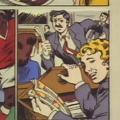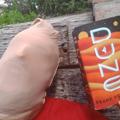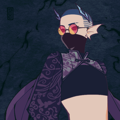I read the first two chapters of The Poppy War in one sitting, and was immediately intrigued. It has a strong start: our heroine is highly motivated to ace these exams as her only ticket to escape being married off to a fishmonger in a backwards town. Her need to not be married to the fishmonger is palpable, visceral, moving. It was impossible not to root for her.
Essentially, this book is the familiar Hero's Journey story, but in the trappings of a fantasy world that has been built not on a Medieval Western kind of setting, but rather a Chinese one.
I could tell that the author's background in historical studies of China has greatly informed their fantasy worldbuilding and I loved it. The fictional history of the world mirrors China's history of being constantly conquered and crapped on by other powers.
I think this highly palatable fantasy YA novel is a great way to convey that kind of history that would help all of us Westerners understand China so much better. One can sense references to the entire history of China from ancient times up through World War II as being condensed into this very simplified history, for one of the subplots of the book is essentially a history lesson. The history that leads up to the events of this story is of immense importance, and learning the sordid details underpinning the propagandized version of the country's official history as taught in schoolrooms is intriguing.
But the history lessons don't steal the show; on the contrary, this is still first and foremost an action story which appeals to the very tropes that are most familiar to us (such as coming from a farming community and going away to the big city to study at a university). I’m a sucker for the trope of a girl from a tiny village showing up at the big university and prevailing against all odds.
But there's a reason, after all, that such tropes are so often employed, and it's that they are narratively powerful. And I have no problems with enjoying a story--such as this one--which implements them with such nuance and power. I loved this book because it was so satisfying and yet original enough that I never got bored.
For instance, there's the nuance that she comes from a household that was an inn and had all of these opium addicts passing through. She escapes this backdrop to go on to the military university, but as she discovers who she is, there are passages about becoming as addicted to praise as opium addicts are to opium. These passages were particularly striking to me. I felt like she was reading my mail, like she understood me on the inside, and that was the moment when I realized this book was of greater depth than being merely fun.
And the book is fun. Our heroine accidentally unlocks powers that are dangerous, a trope I never get tired of when implemented well. There’s this fight where she’s about to explode in fire at someone, which feels like an analogy for an experience I've had many times.
You also have a bit of the "descent into madness" plot employed in this book. There's a really cool part about meditating for days without food until you start to hallucinate the gods...very cool idea.
Also, when the professor you start studying under lets you know that oh yeah, by the way, the last few students I had went insane or were expelled. (lol!)
I love her teacher Jiang. He's idiosyncratic, eccentric, sometimes even juvenile. I'm a sucker for the master who defies all expectations.
But (spoilers) I was really disappointed with him disappearing halfway through the book. Kind of lame after having the build-up to him being this awesome teacher. And ultimately I wish he had actually taught her a bit more before the story ended, but that's ok.
But at the same time it did seem that him not being there was indicative of the kind of story being told...this wasn't a story about a student who heeded her master's warnings...it's the kind of story about a student who's so besotted with revenge that she throws caution to the wind.
And then there's a huge twist to the direction of the story halfway through, and it jarred me, but I came accustomed to it. Essentially, the story becomes a hellscape as a war develops between their nation and a neighboring one, which gets the upper hand. Only after reading the book did I learn that the main plot of the book is based on the events of the Rape of Nanking, which was a horrific event in history where the Japanese decimated a great Chinese city during WWII. It was not fun to read about and one can't help but feel sad and a bit depressed at the atrocities, but after all, this is more realistic than most fantasy books with wars in them. This is something about history, about life itself to reconcile ourselves to: very, very bad atrocities happened. Are happening. Will happen. And we have to go on with living hopefully despite that knowledge, and not sweep it under the rug. I think many people will dislike the book for that sole reason, but as for me, I never fault a book for deviating from what makes a satisfying story if it's for the purpose of portraying uncomfortable real truths that need to be faced. I felt sad, but not disappointed; never that--for I don't read to escape, but to be elevated.
With that said, I did enjoy the rage- and fire-fueled revenge angle that it went down and that kind of fit the plot--with all the trauma that someone goes through with an event like the Rape of Nanking, how could one not go that direction? At least it's very understandable.
I'm looking forward to any other future books this author writes, as she seems to be very adept at weaving satisfying plot, historical backdrop, worldbuilding, nuance, and emotional depth/insight all into a dizzying cocktail. And this was just her debut novel. I look forward to reading the rest of this trilogy and to reading Yellowface and Babel, other novels she has written in the years since Poppy War.
One interesting side note to leave you with. There's a part that references trigrams and 64 gods; this is a reference to traditional Taoist concepts that go back to ancient China.
The most ancient text written in Chinese that we have is the I Ching, or Book of Changes. And basically this wisdom book is the foundation of Taoist thought and philosophy, and the foundation of ancient Chinese society. They used this wisdom book for divination: you ask a question, then generate a random number from 1-64, then look up that section in the book and see what it says and how it could apply to the question you asked.
Here's my review on the I Ching if you're interested:
https://www.goodreads.com/review/show/3712978363















